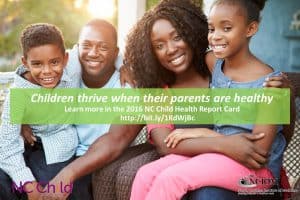By Michelle Hughes, Executive Director
 When it comes to a child’s health, the apple doesn’t fall far from the tree. Data from the 2016 Child Health Report Card, published by NC Child and the North Carolina Institute of Medicine (NCIOM), show critical links between a child’s health and that of her parents, which is why investments in parents’ health yield big returns for children.
When it comes to a child’s health, the apple doesn’t fall far from the tree. Data from the 2016 Child Health Report Card, published by NC Child and the North Carolina Institute of Medicine (NCIOM), show critical links between a child’s health and that of her parents, which is why investments in parents’ health yield big returns for children.
The Report Card reveals that North Carolina has made important gains in many areas of child health. The percentage of children without health insurance has hit an all-time low at 5.2% and the teen birth rate continues to decline dramatically. If we want to build on this success, more attention needs to be given to the significant impact that improving the health of parents would have on children’s health.
For instance, North Carolina’s infant mortality rate has stalled after declining for most of the past 20 years. The lack of progress is connected to persistent health challenges facing parents, particularly people of color and those struggling financially before and during a pregnancy. These health challenges are difficult to overcome without insurance. In 2014, 17.4 percent of parents (324,000) were uninsured, which means they lacked access to affordable check-ups, basic health services, and prenatal and postnatal care.
Addressing parental uninsurance is also an effective strategy for getting more children insured. Despite our progress over the past five years, there are still 120,000 children in our state without insurance, which means they don’t have access to preventive care like check-ups, immunizations, and dental cleanings, which can have a long-term impact on not only their health, but also their education and economic status.
About two-thirds of these uninsured children are eligible for either Medicaid or NC Health Choice, but not enrolled. That’s why it’s so important to make health insurance available to parents—when uninsured parents become insured, they often learn of and enroll their children in insurance programs for which they are already eligible. We have seen this phenomenon in North Carolina and in other states.
The list of connections between parental and child health is long. Children who grow up in homes where parents suffer from mental illness and substance abuse are more likely to suffer from those same conditions. The children of parents who smoke have worse birth outcomes, get sick more often, and are more likely to smoke themselves. Parents’ eating behaviors and levels of physical activity also significantly impact those of their children.
The good news is that an affordable and effective strategy for insuring parents and improving their health is at our fingertips—we just have to use available federal funds to close the health insurance coverage gap.
Right now, 500,000 adults are stuck in the coverage gap with no good way to get insurance. Many of them work in industries like retail, food service or construction that don’t offer employer-sponsored health insurance, and where wages are too high to qualify for Medicaid but not enough to afford insurance in the private market.
North Carolina has the opportunity to use available federal funding to close the coverage gap and provide hard-working North Carolinians with affordable health insurance options, which will improve the health of their entire families. The decision about whether to close the gap rests with the governor and the legislature.
The 2016 Child Health Report Card makes very clear the connection between parental health and children’s health. Children’s futures are inextricably linked to the resources their families have to care for them, and health care is a big part of that. Policymakers should keep this fact in mind as they consider strategies for improving the lives of our state’s children.
